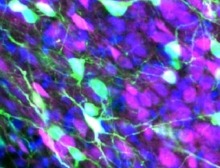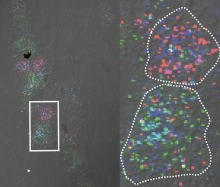
NIDCR's Spring 2018 E-Newsletter is now available.
In this Issue:
Science Advances

NIDCR-supported researchers at Duke University gained new insights into why face and head pain often seems more severe, emotionally draining, and scary than pain elsewhere in the body. By teasing apart neural pain circuits in mice, a team including PhD candidate Erica Rodriguez and her mentor Fan Wang, PhD, found a previously undiscovered pathway that conveys facial pain signals directly to a key emotion-related node in the brainstem. The findings may point to improved treatments for chronic pain conditions that affect the head and face. Rodriguez received NIDCR funding via a Ruth L. Kirschstein Predoctoral Individual National Research Service Award (NRSA) to Promote Diversity in Health-Related Research (F31).

Touch is a complicated sense that results from many different types of mechanical stimuli: pressure, texture, vibrations, and more. Recent studies by NIDCR researchers and other NIH scientists have begun to unravel how touch detection is regulated at the molecular level to produce distinct responses in different classes of sensory cells. The research was led by NIDCR’s Mark Hoon, PhD, and Alexander Chesler, PhD, of NIH’s National Institute of Complementary and Integrative Health. The research establishes that many aspects of our sense of touch result from the genetic gymnastics of a single gene, Piezo2. “In the long run, a better understanding of touch might point to potential therapies for relieving pain or other unpleasant sensations,” said Hoon.






















.png)











No hay comentarios:
Publicar un comentario